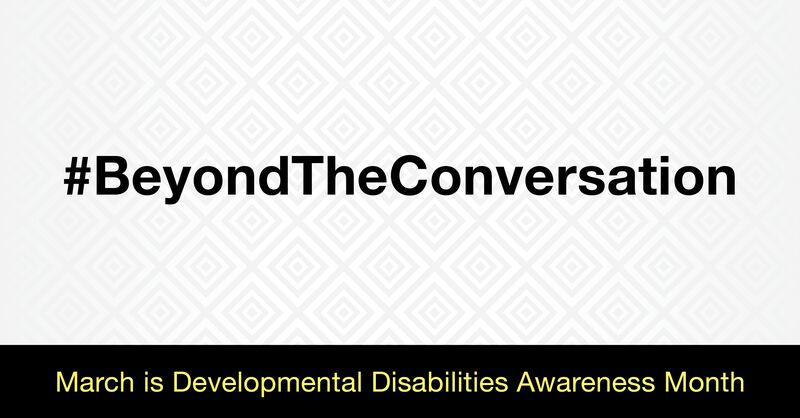
March is Developmental Disabilities Awareness Month (DDAM), a national event that aims to raise awareness about the importance of inclusion of people with developmental disabilities. The National Association of Councils of Developmental Disabilities (NACDD) works with other partners in the community to create a campaign designed to highlight the many impactful ways that individuals with and without disabilities come together to form inclusive communities across the country. The month-long awareness hopes or is designed to increase an understanding of how members of the disability community navigate challenges and how to promote equity in society.
But first… What are developmental disabilities?
Developmental disabilities (DD) are a group of conditions due to an impairment in physical, learning, language, or behavior areas. These types of conditions present themselves during the developmental period, can affect daily functioning and last throughout a person’s lifetime. In the U.S., about one in six children have one or more developmental disabilities or developmental delays.
As children grow, developmental monitoring is an important and ongoing process between parents and providers about their child’s skills and abilities. The process includes examining how a child is growing and if the child is meeting certain developmental milestones, or abilities that most children reach by a certain age in areas that include learning, speaking, behaving, and playing.
Developmental screening looks at how a child is developing. It is typically a part of children’s healthcare visits and involves a series of questions at various ages, including at 9, 18, 24, and 30 months. These questions are based off of research that compares the child to others of the same age and ask about how a child speaks, moves, thinks, as well as questions about their socialization, behaviors and emotions.
Who does it affect?
DD occurs among all racial, ethnic, and socioeconomic groups. Common types of DD include:
- ADHD
- Autism spectrum disorder
- Cerebral palsy
- Hearing loss
- Intellectual disability
- Learning disabilities
Living with Developmental Disabilities
Children, and adults, with disabilities benefit and need healthcare programs to stay well, active and be a part of their communities. Just because someone is diagnosed as having a disability does not mean that they cannot be healthy.
Living a healthy lifestyle can mean the same thing for everyone: staying well helps us achieve full and active lives. When everyone has the proper resources and information, then they can use that to make the healthy choices and know how to prevent some illnesses. Because some health conditions are more common among individuals with DD, it is very important that children with developmental disabilities see their healthcare providers regularly.
What’s next?
This year’s DDAM theme is Beyond the Conversation, and it focuses on the question of: What’s next? What can individuals and communities do to move past the discussions and really act?
Check out this fact sheet by the State Councils on Developmental Disabilities (DD Councils). They have identified some of the most critical needs of people with DD and work to address these through advocacy, systems change, and inclusion. They talk about creating partnerships, collaborations and groundbreaking programs that involve people with DD with the goal of providing equal opportunities and improving the lives of people with DD.
The National Network of University Centers for Excellence in Developmental Disabilities Education, Research, and Service (UCEDDs) are a nationwide network of independent centers that address issues, find solutions and advance research related to the needs of individuals with developmental disabilities. They provide support activities that target a range of issues, from early intervention to supporting employment. To learn more about a UCEDD program near you, check out this directory.
The Administration for Community Living (ACL) seeks to build programs that create a society where the rights of people with disabilities are protected, and they live lives that are free from abuse and neglect. The ACL’s Administration on Disabilities enforces these beliefs through different types of programs such as State Protection and Advocacy Systems that protect individuals with disabilities and encourages them by advocating on their behalf. These Protection and Advocacy Systems offer support to underserved populations and help them navigate through the legal system so that systems can change. The end goal for these organizations is to provide individuals with disabilities with the ability to exercise their rights to make choices, be contributing members of society and ultimately live independent lives. To learn more about other programs under the ACL, visit this website.
How can I get involved?
The most important thing anyone can do to get involved is to simply learn more about DD and what is already being done to promote awareness and inclusion. There is so much information available with groups mentioned above. There are also upcoming webinars and live podcasts that shed more light on the issues of living with DD. Additionally, signing up for newsletters, visiting websites, and attending conferences can all help the community understand what inclusion looks like and learn ways to support individuals with disabilities.
For DDAM, there are trending hashtags, including:
- #DDawareness2023 (NACDD full tag)
- #DDAM2023 (NACDD short-form tag)
- #BeyondTheConversation (NACDD theme-specific tag)
- #DevelopmentalDisabilities (tag to reach a wider audience)
Join the conversation on Twitter by following @ACLgov and @NACDD.
Conclusion
Sometimes, it can take participating in uncomfortable conversations to create a positive impact. Taking small steps can lead to major changes. When everyone is included in all aspects of society, we are more likely to see the person rather than focus on their disability.